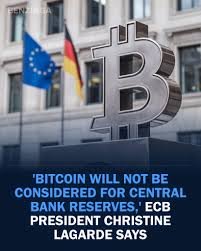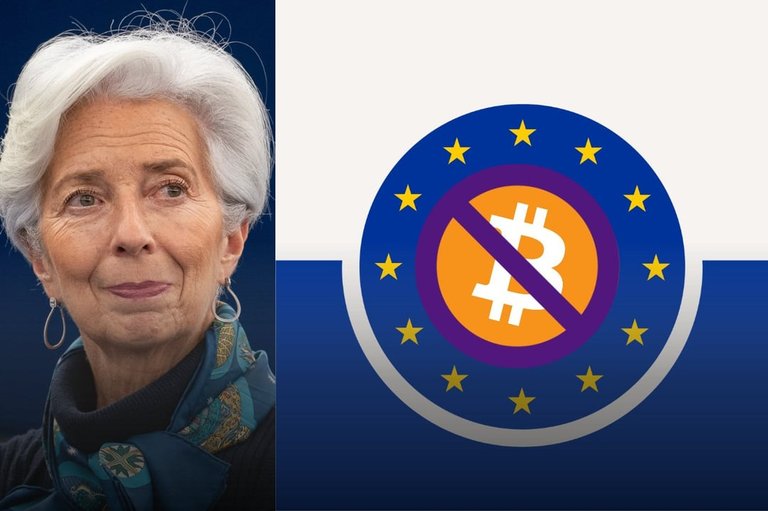
In a widely anticipated move, the European Central Bank (ECB) reduced its deposit rate by 25 basis points to 2.75% on Thursday, signaling a cautious step toward monetary easing. However, alongside this decision, ECB President Christine Lagarde unequivocally dismissed any possibility of adding Bitcoin (BTC) to the central bank’s reserves, citing concerns over liquidity, security, and regulatory risks.
Her remarks contrast with the more open approach taken by some policymakers in the United States, sparking discussions about whether Europe’s stance on digital assets will evolve in the future.
ECB Rejects Bitcoin Reserves: A Firm Stance on Digital Assets
At the press conference following the rate cut announcement, Lagarde firmly shut down speculation that the ECB would consider Bitcoin as part of its official reserves.
“Reserves must be liquid, secure, and safe. They should not be associated with money laundering or other criminal activities,” Lagarde stated.
She highlighted Bitcoin’s price volatility and its historical use in illicit transactions as primary reasons why it remains unsuitable for the ECB’s reserve holdings.
Diverging Views on Bitcoin in the Financial Sector
Lagarde’s stance contrasts with recent remarks from Czech National Bank Governor Ales Michl, who acknowledged that Bitcoin had been discussed as a potential diversification tool, though not formally considered for reserves.
Moreover, her opposition stands in contrast to Federal Reserve Chair Jerome Powell, who has taken a more nuanced stance on Bitcoin and cryptocurrencies. Powell recently noted that commercial banks in the U.S. are free to provide services to crypto clients as long as they effectively manage associated risks.
While the ECB maintains a strict rejection of Bitcoin as a reserve asset, the U.S. is seeing growing state-level interest in digital assets. Over 10 U.S. states have moved toward establishing Bitcoin reserves, and several other nations are exploring similar policies.
Bitcoin’s Market Response
Despite the ECB’s opposition, Bitcoin’s price climbed 3% in the past 24 hours, surpassing $105,000. The surge suggests that investor sentiment remains resilient, even as European regulators maintain a skeptical stance toward the cryptocurrency.

ECB Hints at Further Rate Cuts Amid Inflation Slowdown
Beyond the Bitcoin discussion, Lagarde provided insights into the ECB’s monetary policy trajectory, signaling that additional rate cuts could be on the horizon if economic conditions warrant further easing.
“We know the direction of travel,” Lagarde stated, adding that the ECB’s future decisions will remain data-driven and dependent on key economic indicators.
Inflation Moderation and Market Expectations
While inflation in the eurozone remains above the ECB’s 2% target, recent data suggests price pressures are easing, increasing the likelihood of further rate reductions. Market analysts anticipate at least three additional 25-basis-point cuts in 2025, with the next potential reduction expected at the ECB’s upcoming policy meeting.
However, Lagarde emphasized that timing will depend on factors such as inflation trends and financial stability risks.
Persistent Economic Challenges in the Eurozone
Despite the rate cut, Lagarde acknowledged that growth risks persist due to geopolitical tensions, trade disruptions, and weakened consumer confidence.
The eurozone economy stagnated in the final quarter of 2024, with Germany and France—two of the bloc’s largest economies—unexpectedly contracting. A slowdown in global trade activity has also raised concerns about Europe’s economic outlook.

Uncertainty Ahead: Can Rate Cuts Revive Growth?
While the ECB’s decision to lower interest rates aims to support economic recovery, questions remain about whether monetary policy alone will be enough to counteract structural challenges facing the eurozone.
With global financial markets adapting to shifting central bank policies, investors will closely watch the ECB’s next moves, particularly as other regions take a more flexible stance on digital assets like Bitcoin.
As 2025 progresses, the debate over Bitcoin’s role in financial reserves, combined with the ECB’s evolving monetary strategy, will remain a key focal point for policymakers and market participants alike.
Secondo me in Unione Europea è da circa 10 anni che si è deciso di rimanere indietro in tanti settori